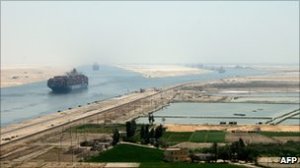Rising debt (both national and personal), higher food prices and soaring unemployment threaten to cripple one of the Middle East’s economic success stories.
Cracks in Egypt’s fragile economy has been exposed
By Russell Hotten Business reporter, BBC News
http://www.bbc.co.uk/news/business-12323037
On the surface, Egypt looked to be a model of economic success.
Even during the years of global financial crisis, its economy held up comparatively strongly, growing 4.7% in 2009 and 5% last year.
GDP growth this year was projected to be a very respectable 6%.
There is plenty of evidence of wealth: modern residential and commercial property developments and a growing middle class that radiates affluence.
The country’s move to a free-market economy, and changes introduced in the 1990s after a banking crisis, undoubtedly benefited sections of the population and encouraged foreign investment.
But the popular uprising that has spread across several cities has exposed fault lines in Egypt’s economic model.
Deep-seated problems that festered for years without much international recognition have burst into the open.
Rising debt (both national and personal), higher food prices and soaring unemployment threaten to cripple one of the Middle East’s economic success stories.
Egypt’s deficit is about 8% of GDP, food price inflation is running at about 17% (with general inflation at 10%) and economists put the unofficial jobless rate at about 25%.
Running for cover
According to the World Bank, about 40% of the population live below its poverty line of $2 a day. These people are dependent on subsidies for food, fuel and other items that are forecast to reach $17.4bn (£11bn) this year.
The sustainability of Egypt’s growth and spending hinges significantly on the confidence of foreign investors, the tourists who flock to Egypt’s resorts and the companies who send their cargo through the strategically important Suez Canal.
The immediate reaction of overseas companies and investors to the crisis has been to run for cover.
The oil price has moved higher, with Brent crude topping $100 a barrel on concerns that the unrest would disrupt deliveries.
Shares in airlines and travel companies with exposure to Egypt and the wider region have fallen. Tourists are being advised either to leave the country or at least to avoid major cities.
Revenues from tourism were about $11.6bn in 2009, and although final figures for 2010 are not yet available, the number of travellers to Egypt rose by 21% in the first half of last year.
About 12% of the labour force work in tourist-related sectors.
The peak travel season runs from mid-October to May, so there may still be many potential tourists who have now decided to look at alternative destinations.
However, the country’s tourist industry has recovered from previous blows.
The killing of 58 tourists in Luxor in 1997 led to a slump in visitors. The 11 September 2001 air attacks on the US, and bomb attacks on tourist resorts in Sinai from 2004 to 2006, led to temporary falls in tourist numbers.
Nevertheless, the long-term trend has been up. In 2000 there were about 5.5 million visitors, generating revenues of $4.3bn.
Egypt’s crisis underlines that we live in an interconnected economic world, but for actual physical evidence of this, look no further than the Suez Canal.
Arguably the single major concern among investors and foreign companies is the threat to the canal, a 120-mile link between the Mediterranean and the Red Sea and Gulf of Suez.
One of the main flashpoints for demonstrations has been the city of Suez.
Despite regulator updates from Egypt’s state media that the canal is operating at “full capacity”, the mere threat of closure has pushed up oil prices.
Detour fears
Roughly 1% of global oil production passes through the canal, either on tankers or via a pipeline.
Some 35,000 ships a year travel via the canal, making it one of the most important cargo routes in the world.
Closure would force ships moving between Asia and Europe to go around Africa’s Cape of Good Hope, adding about 6,000 miles to the journey.
Tom Bentz, analyst at BNP Paribas, says “there is some nervousness about supplies” and believes that any disruption at the canal would affect Europe more than the US.
The canal is one of Egypt’s major revenue-earners, alongside tourism and oil and gas exports.
The Suez Canal Authority reported this month that revenues in 2010 were $4.77bn, up $484m on 2009, thanks to the global economic recovery.
Despite a belief among analysts that the Egyptian authorities will crack down hard on attempts to disrupt the canal’s operations, shipping companies remain cautious.
Danish shipping and oil group AP Moller-Maersk said on Monday that it had suspended port terminal operations and closed its shipping offices in the country.
The company, the world’s biggest container shipping business, said that the unrest had begun to affect its commercial and operational activities.
“Today, there are no terminal operations in Egypt and Maersk Line, Safmarine and Damco offices are closed,” the company said in a statement.
The company, through a subsidiary, owns 55% of a container terminal at the canal. However, a spokesman declined to speculate on the impact of the uprising on the canal’s operation.
Confidence crisis
Many Egyptian experts and analysts have pointed out that, despite the seriousness of the situation, the country is not about to implode.
But Maersk’s decision is an indication that, whatever Cairo may say officially about the unrest’s economic impact, this is not business as usual.
One of the big unknowns about the unrest is whether the protests will exacerbate the international crisis of confidence or usher in changes that will repair the damage.
In a recent report, the International Monetary Fund warned that unemployment in Egypt, which the IMF put at 2.3 million in 2008, will reach 7.1 million in 2020 at its current growth rate.
The IMF forecast that only economic growth of 10% a year would soak up the growing population. And that can only be achieved through increased foreign investment, the organisation said.
For the moment, though, that investment is probably on hold.


